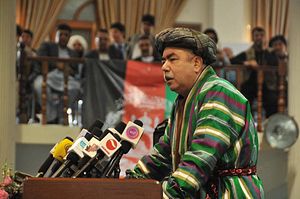A crowd of hundreds reportedly gathered at the airport in Mazar-i-Sharif on Monday night, anticipating the return of Afghan Vice President Abdul Rashid Dostum. The plane never landed.
According to the New York Times’ account, Dostum’s supporters waited for hours into the night expecting a small private plane to land and offload the former warlord who has been in Turkey for two months. Dostum’s stint in Turkey was billed as a trip to seek medical treatment, but for many it looked like exile as the clouds of controversy gathered.
The former governor of Jowzjan, Ahmad Ishchi, who is often described as Dostum’s political rival, accused the vice president of kidnapping, torture, and rape in December 2016, after Ishchi was reportedly beaten up and detained by Dostum and his men at a buzkashi match. The accusations sparked into international calls for an investigation, which has slowly moved forward. On July 12, the Afghan attorney general’s office confirmed to VOA that the charges against Dostum had been investigated and the case had been submitted to a court in June.
What exactly happened Monday night remains somewhat unclear. Initial breaking news reports said that the plane carrying Dostum was headed for Mazar-i-Sharif, then directed to Kabul but couldn’t land, and ended up in Ashgabat, Turkmenistan. Several narratives have emerged since.
Some, such as Balkh provincial council member Raees Abdul Khaliq, pointed squarely to the government in Kabul for preventing Dostum’s return. Khaliq told the Times, “The central government, against all the laws of Afghanistan and the world, against the fact that the president cannot rule an ordinary citizen — let alone the vice president — a criminal until proven by a court, told the plane not to land.”
One of Dostum’s senior commanders confirmed the same to the Times and so did an official close to Balkh province’s governor, Atta Muhammad Noor. But on Tuesday morning, Noor and Dostum’s offices made statements that the vice president was not on the plane, instead a handful of “special guests” were. Noor’s official statement said that the plane experienced technical difficulties and returned to Turkey. Noor also said Dostum was still in Ankara.
There are no Turkmen news sources worth checking for reporting on whether or not Dostum landed in Ashgabat.
The story coming from Western officials, as told to the New York Times, and Afghan officials, as told to Tolonews, is closer to the original: Dostum’s plane was headed for Mazar-i-Sharif but aroused suspicion (possibly because Dostum’s present on the plane was not stated officially but suspected) and the plane was directed to Kabul. The Times reported that a Western official who was at the airport, said Noor called the commander of coalition forces in northern Afghanistan in an attempt to get permission for the plane to land. But the coalition, reportedly, directed Noor to Kabul.
Resolute Support issued a statement Tuesday noting that “Afghan Vice President Dostum’s aircraft was not denied permission to land at Mazar-e-Sharif Airport by German Forces. It is not the business of the Resolute Support Mission to get involved in internal Afghan Government matters.”
Western coalition forces are trying to hold as far back from this issue as possible. Dostum’s position, power and the allegations levied against him are very sensitive, and decidedly domestic, issues.
Dostum is at the heart of a new political alliance, set against the powers-that-be in Kabul and centered in Mazar-i-Sharif. “The central government,” the Times wrote, “appears to have feared that Mr. Dostum was returning to Afghanistan to consolidate that coalition.”
This is not an altogether absurd fear. Dostum, like many of the country’s civil war-era warlords, has spent time on various sides of the multi-faceted and interlaced conflicts that have ravaged Afghanistan. He fought with Ahmad Shah Massoud in 1992 against the now-returned Gulbuddin Hekmatyar; only a few years later to team up with Hekmatyar against Massoud and the government of Burhanuddin Rabbani. Dostum, technically still vice president and second in line for the presidency, is a powerful figure and removing him — should he be found guilty — will not be an easy proposition.
An Afghan source told Tolonews that Dostum’s plan is now to “drive by car from Ashgabat to the country.” We’ll see where in the world Dostum turns up next.

































